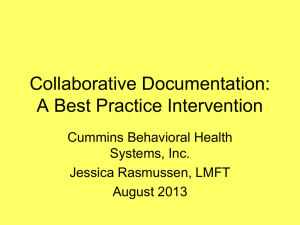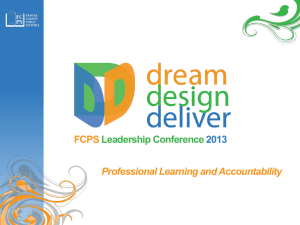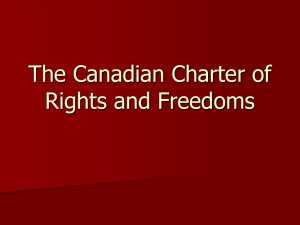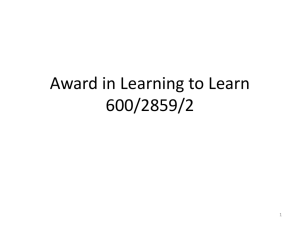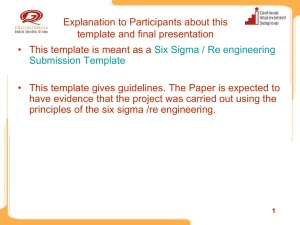- National Charter School Resource Center
advertisement
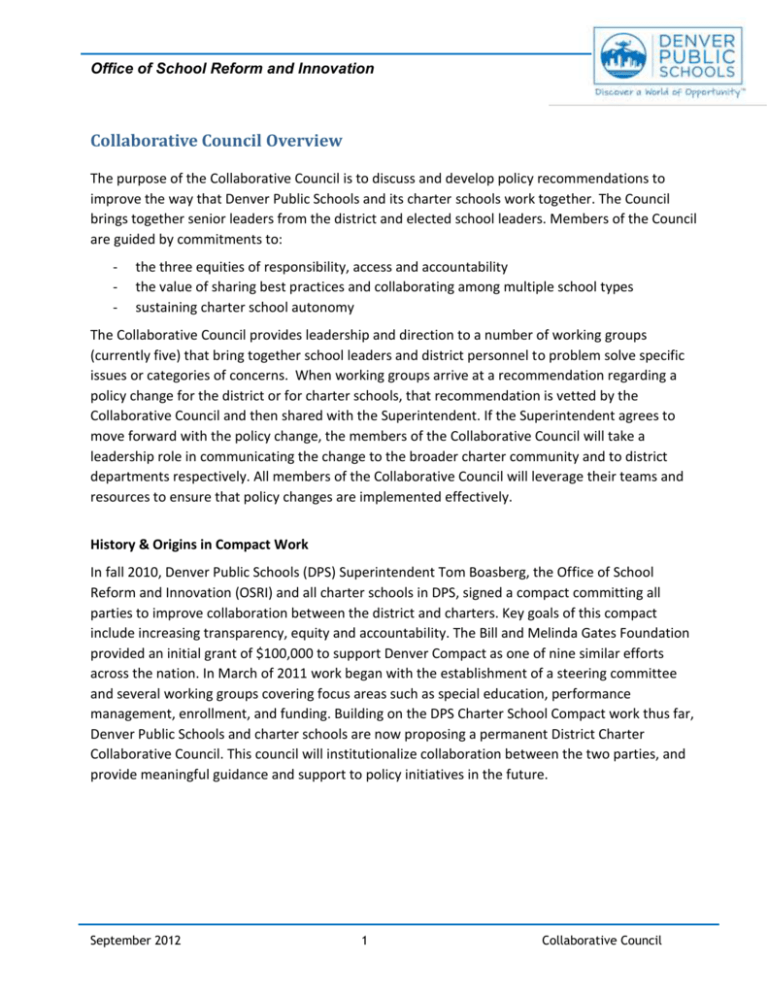
Office of School Reform and Innovation Collaborative Council Overview The purpose of the Collaborative Council is to discuss and develop policy recommendations to improve the way that Denver Public Schools and its charter schools work together. The Council brings together senior leaders from the district and elected school leaders. Members of the Council are guided by commitments to: - the three equities of responsibility, access and accountability the value of sharing best practices and collaborating among multiple school types sustaining charter school autonomy The Collaborative Council provides leadership and direction to a number of working groups (currently five) that bring together school leaders and district personnel to problem solve specific issues or categories of concerns. When working groups arrive at a recommendation regarding a policy change for the district or for charter schools, that recommendation is vetted by the Collaborative Council and then shared with the Superintendent. If the Superintendent agrees to move forward with the policy change, the members of the Collaborative Council will take a leadership role in communicating the change to the broader charter community and to district departments respectively. All members of the Collaborative Council will leverage their teams and resources to ensure that policy changes are implemented effectively. History & Origins in Compact Work In fall 2010, Denver Public Schools (DPS) Superintendent Tom Boasberg, the Office of School Reform and Innovation (OSRI) and all charter schools in DPS, signed a compact committing all parties to improve collaboration between the district and charters. Key goals of this compact include increasing transparency, equity and accountability. The Bill and Melinda Gates Foundation provided an initial grant of $100,000 to support Denver Compact as one of nine similar efforts across the nation. In March of 2011 work began with the establishment of a steering committee and several working groups covering focus areas such as special education, performance management, enrollment, and funding. Building on the DPS Charter School Compact work thus far, Denver Public Schools and charter schools are now proposing a permanent District Charter Collaborative Council. This council will institutionalize collaboration between the two parties, and provide meaningful guidance and support to policy initiatives in the future. September 2012 1 Collaborative Council Office of School Reform and Innovation Council Structure The following graphic outlines the structure and concept of the Collaborative Council and its associated Working Groups. The Collaborative Council is made up of nine members: Four charter school representatives elected by their peers to serve two-year terms that run concurrent to the school years and that are staggered 2/2 One charter school representative that is appointed by the four elected charter members to help ensure adequate diversity of representation Four district leaders from the Senior Leadership Team, including the Chief of Innovation and Reform Council members select Co-Chairs (one charter and one district) from among the members to lead the work of the Council, including setting agendas, communicating with Working Groups and surfacing Council recommendations to the Superintendent. September 2012 2 Collaborative Council Office of School Reform and Innovation Working Groups Overview There are five active Working Groups that bring together additional charter and district representatives to develop recommendations and problem solve around specific areas of practice. Working Groups are made-up of: Co-Chair, who is a member or designee from the Collaborative Council Co-Chair, who is a district or charter leader (to complement the perspective of the first CoChair) Charter school members who choose to participate (open invitation) and who may be Principals, Business Managers or other leadership personnel from the schools District members who have been asked to participate on the basis of their role and responsibility within the district Community partners who may volunteer or be asked to participate to lend specific expertise or perspective Working Group to Collaborative Council Connection Working Groups are focused on more in-depth review of policies and practices that impact charter schools and the district. Working groups are designed to problem solve and/or produce solutions or recommended policies in the following categories: - Policy initiatives and/or practice development topics supplied by the Collaborative Council at the beginning of the school year (these should be priorities) - Concerns or issues identified by the Working Group members Outcomes and outputs from the Working Groups may fit into one of more categories of: - Policy-related recommendations that are made to the Collaborative Council and that may require review/approval from the Superintendent and Board - Practice improvements that are embraced by the district and/or by charter schools to resolve an existing concern or disconnect and that may not require Superintendent review - Reports or frameworks that can be used to guide future action and/or decision-making (these would go to the Collaborative Council and charters more generally) Working Groups shall not exist indefinitely and their constitution and direction will be annually confirmed by the Collaborative Council. Meetings The Collaborative Council shall meet the second Friday of each month. The schedule will be published on the OSRI web-site and communicated to schools, district personnel and community partners. Meetings are open to observers and non-members. September 2012 3 Collaborative Council Office of School Reform and Innovation Time Commitment & Terms Members are expected to participate in ten Collaborative Council meetings a year. Meetings will last an average of 1.5 hours. Co-Chairs dedicate additional time preparing for meetings and negotiating policy recommendations in between meetings. Members who lead Working Groups dedicate additional time to those separate meetings. The initial terms for elected Charter School Members shall be staggered such that half the members serve for 1.5 years and half serve for 2.5 years. Subsequent terms for charter leaders will be two years (staggered). The initial term for the appointed charter school member shall be 1.5 years, though subsequent terms shall be one year. Once elected, charter members shall agree to who will serve for which term length. Council Progress Reporting Annual Progress Report The Council shall develop and distribute an annual progress report that identifies the policies and changes that were addressed by the Council for the school year. Working Group Co-Chairs shall contribute brief reports on their progress as part of the annual Collaborative Council Progress Report. OSRI will support the production and distribution of the report to ensure that it is available to all charter schools, relevant district personnel and community partners. Minutes & Transparency OSRI shall organize the publication of the annual Collaborative Council meeting schedule (via website and email distribution). In addition, OSRI staff will support the creation and publication of minutes for each Collaborative Council meeting. Designated OSRI staff will also support each Working Group in creating materials to report on and track progress. Where appropriate, OSRI or other designated district staff shall manage the meeting invites and logistics for all Working Group meetings. September 2012 4 Collaborative Council



